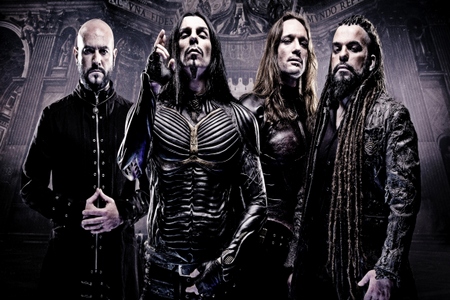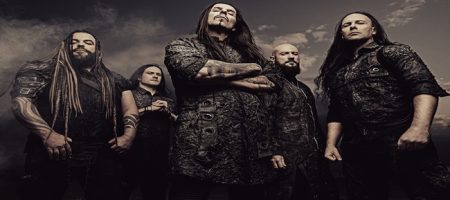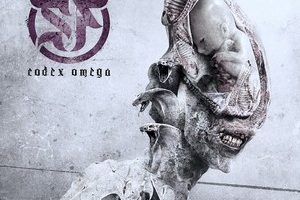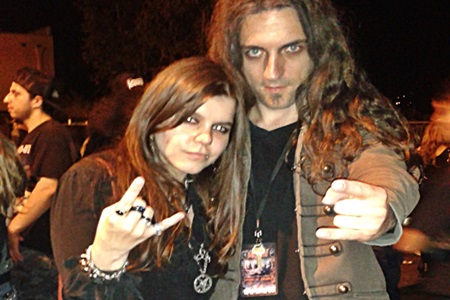Septicflesh – Their Titanic Work
Sunday, 10th August 2014
I like to refer to these guys as the Greek gods of symphony metal. Think about it: they’re Greek, they’re god-like (in a musical sense) and they’re symphony metal prodigies. To top it off, each member of Septicflesh strictly takes on their designated role with intense seriousness and, for the most part, each of them work separately on their own piece of the puzzle until the final decisions are made, not to mention collaborating for the composing, processing, mixing and all the other fun but tedious stuff real musicians do. One of Septicflesh’s finest traits, as simplistic as it sounds, is all the work they do is authentically their own work including everything from composing sheet music, writing lyrics and drawing album art. Most probably already know Septicflesh have created a masterpiece called Titan. Why is it called Titan? Here’s a hint: it’s not named after the titans and has virtually nothing to do with titans or mythology in any manner. Ironic, isn’t it? Look at Titan, in terms of the name, as an adjective not a noun. Think of music that’s monstrous, ominous, doomy and bestial, but most of all titanic. Bigger than all the other beasts, that’s what a titan is. Septicflesh’s masterpiece, Titan, is their biggest album yet and, according to Christos, their most titanic work of all.
It’s the fourteenth show of the 2014 Conquerors of the World tour and I’m at the Oakland Metro Opera House to meet, greet and interview Septicflesh, video and audio recorders ready to go but stupidly no tri-pod. The interview was conducted in their very nice but slightly crammed tour bus. The only issue was placing the camera where I’d get a decent shot but also somewhere stable enough where it wouldn’t fall lest the bus shakes or moves. Goal accomplished but I did unintentionally cut 90% of myself out of the video and I’m glad I did because I got a great shot of Christos! Check it out below.
This paragraph is a bonus exploit, just for fun. To be clear, I did talk to Seth before this happened so that eliminates all rudeness. This is something Septicflesh fans and/or gamers might especially find amusing. Interview or not, it didn’t matter, there was absolutely no way anyone was going to divert Seth’s attention from this video game he was playing. Don’t ask me which game or what console, I have no clue, I was more focused on seeing whether he’d blink or not. Nope!
The interview was answered entirely by Christos Antoniou, bassist and orchestral composer of Septicflesh.
Dead Rhetoric: I’m here with one of the Greek gods of symphony death metal, Christos, at the Oakland Metro Opera House where Septicflesh will be playing tonight. We’ll be talking about symphony music, death metal, Septicflesh and all sorts of stuff. Let’s start off with symphony, orchestra and death metal, shall we? How would you compare your band to other symphony-metal bands and other metal bands as a whole spectrum?
Christos: The orchestra plays an important role for Septicflesh and because I have studied classical music, orchestration and composition, we use this as a weapon and I believe, not because of me but because of my studies, our use of orchestration is different from other bands, not only from other metal bands but also from symphonic-metal bands. We don’t use the orchestra in a conservative way, we want to experiment and risk more with the orchestra, more with the colors and that sort of stuff. I think this is the difference between Septicflesh and the other bands.
Dead Rhetoric: So in using the orchestra very unconventionally and very unique in the metal-symphonic world, how do you find a balance between all that? What’s your compositional process and how do you go about finding a balance between symphony and metal?
Christos: All of us in Septicflesh compose the music. Of course, some of us compose more than others… Sometimes we put the songs in an orchestral template, my orchestral template, or sometimes the guys bring in their metal ideas and I orchestrate on top of that. Now for the process, we follow our instincts. We don’t follow any rules or write something for a hit or to impress, we just follow our soul and we focus to create something that will have a meaning.
Dead Rhetoric: Would you say it’s more or less difficult to compose symphony-metal music in comparison to other bands? You have the symphony and orchestra to stabilize you but does it make it more difficult to work with that or do you think you have it easier as a band?
Christos: It goes with my studies. When we have this weapon, we have to use it. For some it’s very difficult to orchestrate or compose but for me it’s not something that’s a challenge and not something I find difficult, I’ve studied to do it. We don’t have to hire anyone to orchestrate for us and this is important because we know from the beginning how the orchestra will sound and how the metal part will sound and from there we could find a balance. Of course when we had our first experience in Communion things were not so easy but not in terms of composition process, it was more about the technical stuff for sound like frequencies and the mixing process, only those sorts of things are an issue for us. With Titan, I think we found the best balance.
Dead Rhetoric: For you personally, having studied symphony and orchestra, what most appeals or most attracts you about the symphony and orchestra? What attracts you to it that makes you want to blend it into metal?
Christos: Well, I like the battle between metal and orchestra. Sometimes they blend together really well and sometimes they have this unconventional fight between them. All of this creates a challenge for Septicflesh to create something that will sound fresh and new for the band. Although we have used the orchestra for the third time, I can see and I believe that we have, by doing all these CDs, done something that doesn’t compete with our previous albums. Our vision is to create something that will not compete to our previous albums and to create something that will be new. We make the band better and better by creating something new.
Dead Rhetoric: On the note of the Prague Philharmonic Symphony Orchestra, like you said, this is the third time you collaborated with them. Of course, would you say you work well with them? How does it all go?
Christos: This is the third time we worked with them for Septicflesh but we’ve also worked with them with my other band, Chaostar, which is mainly classical ambient music, and I’ve done some other projects with them in other bands. I know them really well and they’re amazing musicians.
Dead Rhetoric: Outsiders of the metal scene and the symphony scene, (based on my own experiences with metal and symphony) might have conflicting differences. For example, if you go to a symphony concert, someone might say something like metal is reckless, belligerent, obnoxious or whatever. So if someone said to you something like metal isn’t considered music what would you say to them?
Christos: I believe it is good music. Why the people from classical music would say metal is reckless, they would not say. The majority of them is well educated and will find the beauty behind metal. Of course, there are obvious indifferences but I cannot see that it would sound to them as, how you call it? Reckless. But yes, people are often, not concerned, but surprised with the orchestra combined with the vocals, with the vocalist growling, sometimes just because they’re not familiar with it. But we see that metal has something to say. It’s not just music for fights, arguments or evolution or whatever.
Dead Rhetoric: Well, that covers that section so let’s move on to the new album, Titan. I, among many, love how heavy, doomy and blackened Titan is compared to some of your previous works. What made you decide to take the heavier route with this album? I mean, the orchestra and symphony are very prevalent and very present as in any other album but it’s still very doomy and dark, and I actually quite amazing. What made you decide to do that?
Christos: We had this idea from the beginning. Before starting the composition process, we said, for the first time, to keep it as dark as we can. For that very reason we set aside some lyrical themes and music themes that would go on the table. Of course, we had some very specific parts like a solo that has this melodic romanticism, I would say, but there are not so many. It was our intention to create something that has more violent and more of a dark character, and also more guitar in the cut.
Dead Rhetoric: So Titan goes into a lot of ancient mythological roots, ancient Greek roots. Like stated in the making of Titan videos, you said that the titan perfectly represents Septicflesh. Can you elaborate on how the Titan represents Septicflesh?
Christos: “Well, uh….”
Dead Rhetoric: (Attempting to not lead but push Christos to answer the question) Would you consider yourselves more like Titans yourselves, or disciples of Titans, honoring the Titans or honoring the legends.
Christos: It’s a strong title and we feel very confident that, for us, Titan stands as our masterpiece. It’s not like it goes back to our roots with Greek mythology but we found that this album is our strongest one and it’ll be our titanic work, not titanic how we think but one that’ll stand as a masterpiece for Septicflesh, and that is the reason behind that.
Pages: 1 2


























